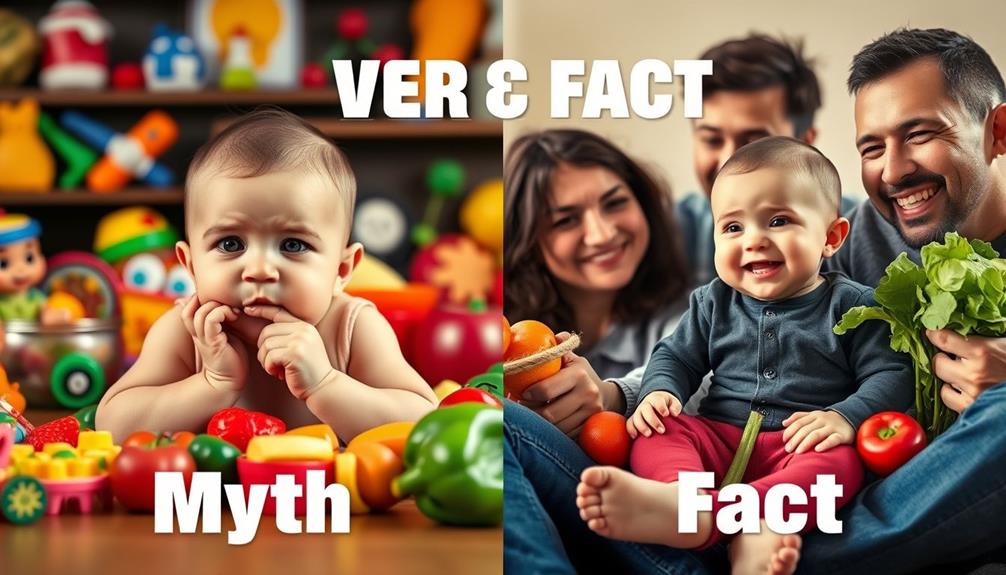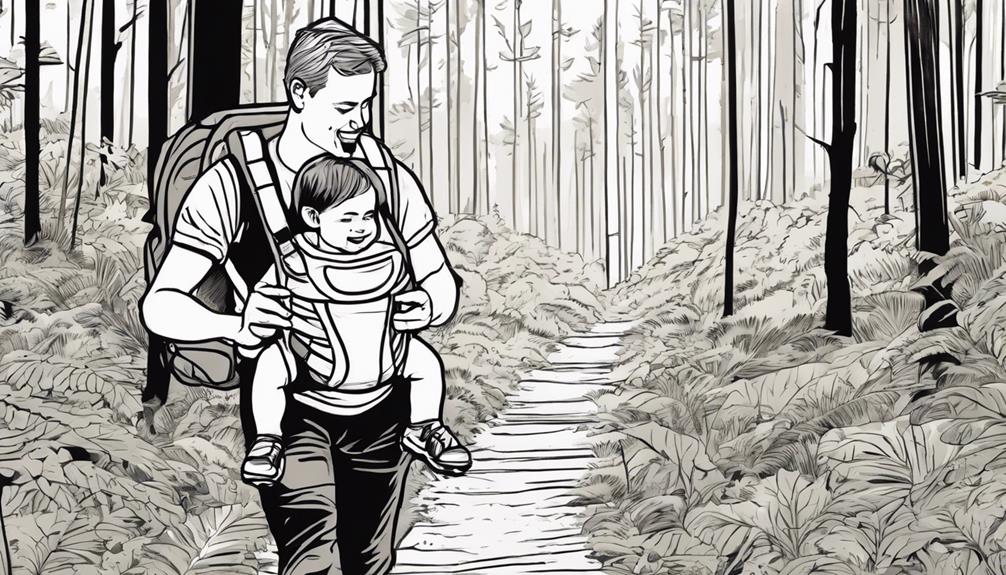As a dad, your involvement uniquely shapes your baby’s emotional, cognitive, and social growth. By actively engaging in routines, playing, and showing affection, you help build trust, security, and confidence. Your presence teaches important life skills like empathy, resilience, and independence. The way you model behavior influences your child’s future relationships and social skills. Embracing your special role creates a strong foundation for their future. Keep exploring how your unique influence can boost your baby’s development even more.
Key Takeaways
- Fathers uniquely foster emotional resilience and independence through positive interaction and modeling behavior.
- Active paternal involvement during routines enhances attachment, security, and understanding of baby’s needs.
- Engaging in play and communication stimulates cognitive, language, and social skill development.
- Fathers influence emotional regulation and self-esteem, shaping a child’s confidence and social adaptability.
- Consistent paternal presence models conflict resolution and relationship skills, impacting long-term social development.

A dad’s involvement plays a essential role in a baby’s development, shaping their emotional, social, and cognitive growth from the very beginning. When you actively engage in your baby’s life, you foster strong father bonding that lays the foundation for their sense of security and trust. This bonding isn’t just about holding or playing; it’s about consistently showing up and being present, which helps your little one develop confidence and emotional resilience. Your interactions, whether through gentle touch, eye contact, or soothing voice, teach your baby that they are loved and protected. This paternal influence influences their ability to form healthy relationships later in life, as they learn what safe, supportive interactions look like.
Your role extends beyond mere presence. By participating in everyday routines like feeding, bathing, or reading, you reinforce your connection and contribute to your child’s sense of stability. These moments allow you to understand your baby’s cues and needs, establishing a secure attachment that benefits their emotional well-being. The more involved you are during these critical early stages, the more you help develop their social skills, such as sharing, empathy, and cooperation, because they observe and imitate your behavior. Paternal influence also impacts their cognitive development, especially when you engage in activities that stimulate curiosity and learning. For example, talking to your baby during playtime, making funny faces, or introducing new sounds helps boost their language skills and problem-solving abilities.
Research shows that fathers who are actively involved tend to raise children with higher self-esteem and better emotional regulation. Your unique perspective and approach can foster independence and resilience, teaching them that they can trust their instincts and explore the world safely. It’s important to remember that your role isn’t just about caregiving tasks but also about modeling behavior. Children learn by watching you handle challenges, express emotions, and interact with others. Your paternal influence acts as a blueprint for their social development, shaping how they approach relationships and conflicts.
In essence, your involvement in your baby’s life isn’t just beneficial—it’s essential. By prioritizing father bonding and understanding your pivotal role, you help set the stage for a healthy, secure, and confident individual. Your consistent presence and positive interactions imprint lasting impressions that influence your child’s growth well beyond infancy. Embrace this role with confidence, knowing that your love and engagement are shaping a bright future for your little one.
Frequently Asked Questions
How Do Fathers Influence a Child’s Emotional Regulation Skills?
You influence your child’s emotional regulation skills through emotional coaching and behavioral modeling. When you calmly help your child identify and express feelings, you teach them healthy ways to manage emotions. By modeling patience, empathy, and resilience, you set a positive example they’ll imitate. Your consistent support and guidance foster their ability to handle stress and develop emotional strength, shaping their overall emotional well-being for years to come.
What Are the Long-Term Effects of Father Involvement on Academic Success?
You might notice that when you’re actively involved in your child’s education, it boosts their long-term academic success. Parental involvement, especially in early literacy, creates a foundation for learning that lasts. Coincidentally, children with engaged fathers tend to develop better reading skills and school confidence. Your support fosters resilience and motivation, ultimately shaping their future achievements and opening doors to lifelong learning and success.
How Can Non-Residential Fathers Positively Impact Their Child’s Development?
You can positively impact your child’s development through virtual presence and emotional support. Staying connected regularly, even from a distance, helps your child feel secure and loved. Engage in meaningful conversations, listen actively, and show genuine interest in their life. Your consistent emotional support builds trust and confidence, fostering healthy social and emotional growth. Remember, your involvement, no matter the physical distance, truly makes a difference in their development.
What Specific Activities Foster Stronger Father-Baby Bonds Early On?
Imagine a father spending 15 minutes daily engaging in playful interactions with his baby, like peek-a-boo or singing. These activities strengthen bonds and boost development. Skin-to-skin contact, like holding your baby close after feeding, fosters emotional security. Both playful interactions and skin-to-skin contact create a nurturing environment, helping your baby feel safe and loved, establishing a strong foundation for your relationship early on.
How Does a Father’s Mental Health Affect Their Child’s Growth?
Your mental health greatly influences your child’s growth. When you maintain good mental well-being, you engage in positive father-child communication, which fosters emotional security and trust. Paternal involvement benefits your child’s development, helping them build resilience and social skills. Conversely, if you’re struggling emotionally, it can affect your interactions, potentially leading to stress or insecurity in your child. Prioritizing your mental health creates a healthier environment for your child’s growth.
Conclusion
Remember, as a dad, you’re like the steady lighthouse guiding your baby’s growth. Your unique presence lights up their world, shaping their confidence and curiosity. Every hug, smile, and word you share plants seeds of trust and resilience, helping them navigate life’s vast ocean. Your involvement isn’t just helpful—it’s the compass that helps your little one find their way. Embrace this role; it’s the most beautiful voyage you’ll ever undertake.










